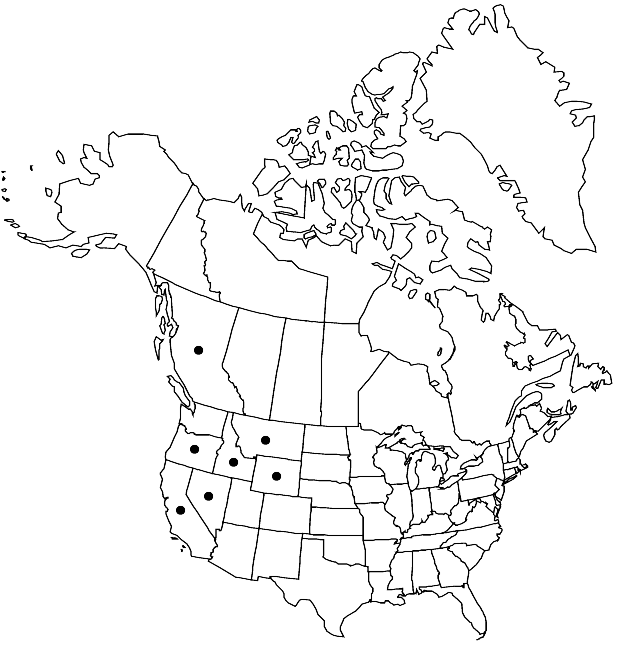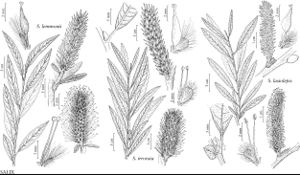Difference between revisions of "Salix lemmonii"
Willows Calif., 88. 1879.
FNA>Volume Importer |
imported>Volume Importer |
||
| (5 intermediate revisions by 2 users not shown) | |||
| Line 8: | Line 8: | ||
}} | }} | ||
|common_names=Lemmon’s willow | |common_names=Lemmon’s willow | ||
| + | |special_status={{Treatment/ID/Special_status | ||
| + | |code=F | ||
| + | |label=Illustrated | ||
| + | }}{{Treatment/ID/Special_status | ||
| + | |code=E | ||
| + | |label=Endemic | ||
| + | }} | ||
|basionyms= | |basionyms= | ||
|synonyms= | |synonyms= | ||
| Line 35: | Line 42: | ||
-->{{#Taxon: | -->{{#Taxon: | ||
name=Salix lemmonii | name=Salix lemmonii | ||
| − | |||
|authority=Bebb | |authority=Bebb | ||
|rank=species | |rank=species | ||
| Line 49: | Line 55: | ||
|publication title=Willows Calif., | |publication title=Willows Calif., | ||
|publication year=1879 | |publication year=1879 | ||
| − | |special status= | + | |special status=Illustrated;Endemic |
| − | |source xml=https:// | + | |source xml=https://bitbucket.org/aafc-mbb/fna-data-curation/src/2e0870ddd59836b60bcf96646a41e87ea5a5943a/coarse_grained_fna_xml/V7/V7_177.xml |
|genus=Salix | |genus=Salix | ||
|subgenus=Salix subg. Vetrix | |subgenus=Salix subg. Vetrix | ||
Latest revision as of 22:31, 5 November 2020
Plants 1.2–4 m, (sometimes forming clones by stem fragmentation). Stems: branches (sometimes highly brittle at base), yellow-brown or red-brown, not to sometimes strongly glaucous, (dull to slightly glossy), glabrous or puberulent at nodes; branchlets yellow-brown to red-brown, (weakly or strongly glaucous or not), puberulent, (buds alba-type or intermediate, scale inner membranaceous layer free, not separating from outer layer). Leaves: stipules absent or rudimentary on early ones, foliaceous on late ones, apex acute; petiole convex to flat adaxially, 5–16 mm, tomentose or velvety adaxially; largest medial blade (sometimes amphistomatous), lorate or very narrowly to narrowly elliptic, 44–110 × 6–22 mm, 3.4–9.9(–12) times as long as wide, base convex or cuneate, margins flat to slightly revolute, entire or shallowly serrulate, apex acuminate to acute, abaxial surface glaucous, sparsely short- or long-silky to glabrescent, hairs (white, also ferruginous), straight or wavy, adaxial slightly glossy, sparsely short-silky, (hairs also ferruginous); proximal blade margins entire or shallowly serrulate; juvenile blade reddish or yellowish green, densely long-silky abaxially, hairs white and ferruginous. Catkins flowering just before or, sometimes, as leaves emerge; staminate stout, (1.4–2.7–)16–28 × 9–17 mm, flowering branchlet 1–3 mm; pistillate loosely flowered, stout, (1.5–2.7–)19–44(–65 in fruit) × 10–18 mm, flowering branchlet 1–6 mm; floral bract brown or bicolor, 1.1–2.4 mm, apex rounded or convex, abaxially hairy, hairs straight. Staminate flowers: adaxial nectary narrowly oblong, oblong, or ovate, 0.3–0.9 mm; filaments distinct or connate less than 1/2 their lengths, glabrous or hairy on proximal 1/2 or basally; anthers yellow, ellipsoid, shortly cylindrical, or globose, 0.5–0.9 mm. Pistillate flowers: adaxial nectary oblong, narrowly oblong, or ovate, 0.4–1 mm; stipe 1.1–2.1 mm; ovary pyriform, beak sometimes slightly bulged below styles; ovules 12 per ovary; styles 0.3–1 mm; stigmas flat, abaxially non-papillate with rounded or pointed tip, 0.2–0.3–0.48 mm. Capsules 5–7 mm. 2n = 76.
Phenology: Flowering early Mar-late Jun.
Habitat: Streams, lakeshores, wet meadows, springs, old burns in subalpine conifer forests, sandy, granite substrates
Elevation: 1400-3500 m
Distribution

B.C., Calif., Idaho, Mont., Nev., Oreg., Wyo.
Discussion
See 85. Salix drummondiana for comments on differences.
Hybrids:
Salix lemmonii forms natural hybrids with S. geyeriana.
Selected References
None.
